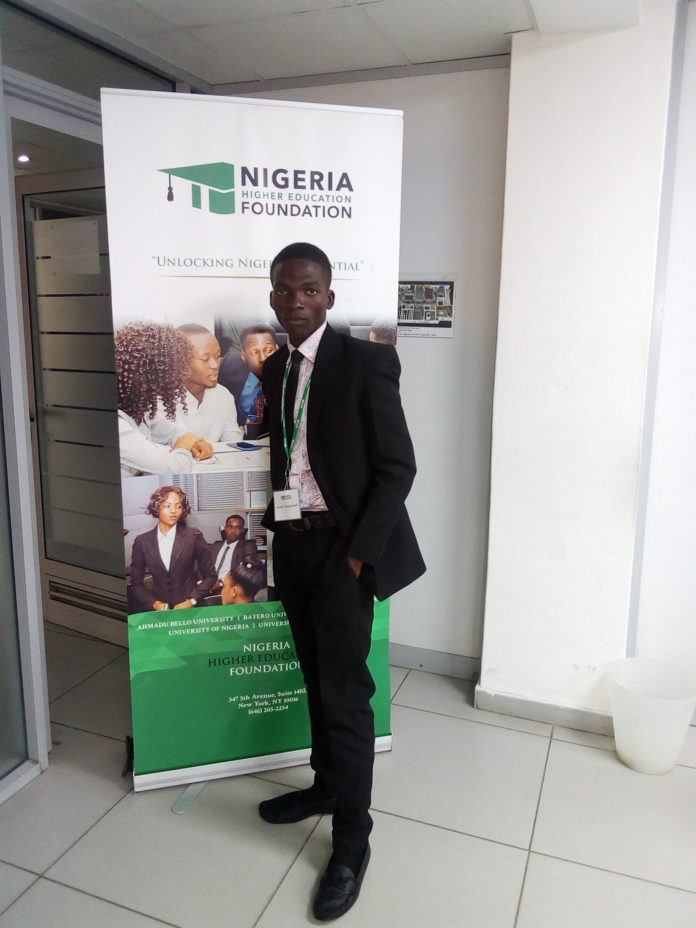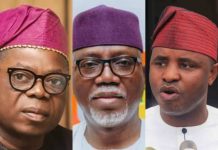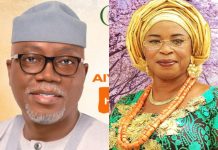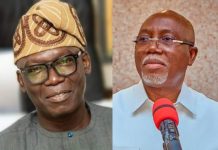
Oluwajuwonlo Afolabi is a first class graduate of the Department of Communication and Language Arts (CLA), University of Ibadan.
Afolabi, who is a freelance reporter with The Precision NG media organization, in this exclusive interview shared the good, bad and the ugly side of his journey to becoming the best graduating student in his department. Enjoy.
Interviewer: Good day, Mr. Afolabi Oluwajuwonlo. The name is known, but the man behind the name seems to tilt toward a private life. Could you introduce yourself?Oluwajuwonlo: I am Afolabi Oluwajuwonlo, a recent graduate of the premier University, University of Ibadan. Yes, I’m a bit reserved but fun to be with. Education and development are my passions.
Interviewer: There’s more to the man, but we will get there. How was growing up like?
Oluwajuwonlo: I grew up in Ibadan. I’ve always wanted to school in UNN; courtesy of Purple Hibiscus by Chimamanda at least to study outside Ibadan for the first time but eventually had to attend the most prestigious University. I grew up in a family of three boys. The experience was that of freedom, confidence and determination to succeed against all odds. Not so a rosy one, but the right foundation for a young boy who aims to be at the top.
Interviewer: What memories from your childhood stand out the most? And, what lifelong lessons from your childhood would you say still influence you till now?
Oluwajuwonlo: During my holidays at our hometown in Osun, I was just a young boy who likes to talk. So, relatives would then identify me as a broadcaster or put it as a journalist. I’m fond of the memory of having to pick up newspaper while returning from school or errands to practice reading and writing as young boy in primary school. The experience of having to succeed at one attempt is always with me on every endeavor.
Interviewer: What changed the decision from UNN to UI? And, had it always been education and CLA for you?
Oluwajuwonlo: My friend, Bolaji influenced my choice of picking UI. The distance to UNN was a factor too. I’m passionate about media. But I’ve always loved development and development related issues. The passion for making a change for humanity made me apply for Law. Of course, the interest then was to be a human rights advocate. I applied to CLA and Education when I didn’t make the cut-off mark for Law. Not making it fueled my interest in making a good grade as a first-year student so I’d be able to cross to Law by the second year. I had a 6.4 overall in 100L but wasn’t allowed to change to Law; as it was put, “Not allowed to go in the best interest of the department.” I’d later realized that with CLA and Education, contributing to development becomes simplified.
Interviewer: Do you think you were not allowed to go “in the best interest of the department” because you had the best CGPA then and were a potential Best Graduating Student?
Oluwajuwonlo: Relatively. But it was a likely reason too.
Interviewer: You held many positions on campus, and still ended up emergent as the Best Graduating Student from your department. When did you make the decision to not limit yourself to academics?
Oluwajuwonlo: I’ve wanted to develop my leadership capacity. One main thing my dad told me while leaving for school was, “meet people, explore.” So, I knew networking was a necessity. Started as a course representative in 100 level. By 200 level, I joined Sigma Club and that changed my orientation and exposure about leadership and success. I learned it’s possible to succeed as an A-student and still make prominent impacts in the microecosystems around you. I joined Building Nations Initiative where I learned in practice, community building. Politics has always been my interest. I actively participated up to the top positions.
Interviewer: Tell us more about your leadership experience. You held top positions in Sigma, and in one of University of Ibadan’s largest halls. How were the experiences, and what memories had the biggest effects on the kind of leader you now aspire to be?
Oluwajuwonlo: I served as the Chief Scribe Sigma Club. Before then I served as the Chairman of Sigma Essay Competition which had Prof. Yemi Osinbajo the Vice President of Nigeria as the guest speaker and the presenter of the prizes for the essay. That was a huge success for me and the club. Serving as the AG of Independence came unexpectedly. As a proactive leader, I rose to the occasion and turned around the soon-to-be-ugly scenario to a mighty success for the Hall. I’ve learned that going forward transparency should be a companion and that a leader is a leader because there are followers. So, the followers are the ‘leader.’
Interviewer: How were you able to combine all these things with your academics so that the one didn’t affect the other?
Oluwajuwonlo: It was simply the grace of God. I adopted a time management that allowed me to attend actively to my studies without leaving extracurriculars behind. Networking to me is part of education. I saw my academic and non-academic activities as education. When the time comes for reading, I read and when it comes for politics, I engaged.
Interviewer: What would you call the biggest challenges you faced in your four academic sessions as a UI student? Was there a time when you wanted to quit it all?
Oluwajuwonlo: Quitting was never an option. I had financial difficulties at some point. It was tough. God helped me. In 300 level, I started working as a tutor for extra income to sustain studying. I’d later get to know about freelance writing in my final year. That created a financial relief.
Interviewer: You were never overwhelmed by the number of things you did?
Oluwajuwonlo: To some extents. I was overwhelmed with long time meetings in Sigma Club. 8-10 hours of meeting mostly overnight influenced my reading habits and concentration in a way. I was able to find my way around it though.
Interviewer: What was your reading style? Would you suggest that anyone adopt it?
Oluwajuwonlo: Anyone interested in a freestyle reading pattern could adopt it. If we covered ten topics in class, I’d go an extra mile to create notes for the topics. I study with past questions and identify unclear areas before exams. A day to exam, you’d find me in bed sleeping. I don’t read when exams come. I do that prior to exam time.
Interviewer: You’re a high-flyer with many achievements to your name: a first-class degree, your department’s Best Graduating Student, one-time Chief Scribe of one of UI’s most prestigious clubs, erstwhile Administrator-General of one of UI’s most influential hall, amongst others. Relating this to the general perception of students of education, what do you have to say?
Oluwajuwonlo: I should quickly correct the general assumption that education as a course of study is for the weaklings. That’s deceptive. Education is for the best minds; those who are regarded as ‘philosopher Kings.’ They are agent of change, nation builders, and world molders. On this basis, I congratulate every student in the faculty of education. Now, let me point out that self-perception and acknowledgement is a major intrinsic issue affecting education students. This is because majority of students in the faculty never thought of picking the course nor practicing as a teacher. The resultant is that, from their 100 level, they tend not to take the course serious. This then affects their grades and performance. From their low grades, due to lack of interest in their courses, education students catalyze the bring-them-down syndrome from externals. Lecturers and students from other faculties begin to see them as the lowly. That’s bad. Aside from their potential abilities to compete as educated individuals, students in the faculty of education especially those from Arts and Social Sciences have double honors as their degree. That’s a huge advantage over others. But many don’t realize. Low level of orientation is also a problem. When I was accepted into Nigeria Higher Education Foundation Scholarship program, many people doubted it. People I encouraged to apply didn’t even bother to open the application. It’s a matter of self-belief and opening up minds to unlimited opportunities.
Interviewer: This is a beautiful summation!
For whatever reasons, you’ve left out your experience as a Nigerian Higher Education Foundation Scholar from your story. Tell us how it was like being selected as one of the 2019 Scholars. You must have been the first student of education to get selected.
Oluwajuwonlo: Yes. First Education and Communication student to make it to the prestigious program. I applied in 300level for the NHEF essay competition. Along the line of submission of the essay, I realized the program includes an in-residence scholars’ orientation and internship. I then applied. I didn’t make it. A program designed strictly for penultimate students but that didn’t quash my can-do spirit. So, in my final year, I reviewed my essays and applied again. I made it. The experience was superb and the networking remains fantastic till now.
Interviewer: What was the most valuable contribution the NHEF Scholarship made to your life?
Oluwajuwonlo: The orientation program was an eye-opener. It’s simply put, “You can do anything as long as you can dream it.”
Interviewer: You are a serial award winner when it comes to essays. Can you remember some essays you won and some shortlists you made?
Oluwajuwonlo: Top 30 in CIPM Essay Nigeria 2019; Winner Aisha Osori Essay Competition 2018; Winner Funmi Obisesan Development and Empowerment Initiative Essay Competition.
Interviewer: If you could do anything differently, what would that be?
Oluwajuwonlo: It’d be to make a wider network of people. Probably joined UCJ. I’ve always wanted to but politics takes the highest love. And the only politics you can get involved in as a journalist is the UCJ politics and contesting for UCJ positions.
Interviewer: What advice do you have for Katangites in particular and Uites in general?
Oluwajuwonlo: Lol, you see why I didn’t join. There’s a place for process in every success. That process involves sacrificing to earn the top badge. It doesn’t always come easily. You have to be intentional, desirous and actively pursuing it. Anyone that wishes to be great should be proactive about it, keep a goal-getting company of friends and put God first in every aspect.
Interviewer: What’s next? What’s your after-school plan?
Oluwajuwonlo: Committing things into the hands of God while looking up to tap into educational opportunities which are bedrock of attainment to contribute positively to the society.
Interviewer: Thanks, so much for having this interview with us.
Oluwajuwonlo: Thanks for having me. I appreciate your good work. God’s blessings always.















